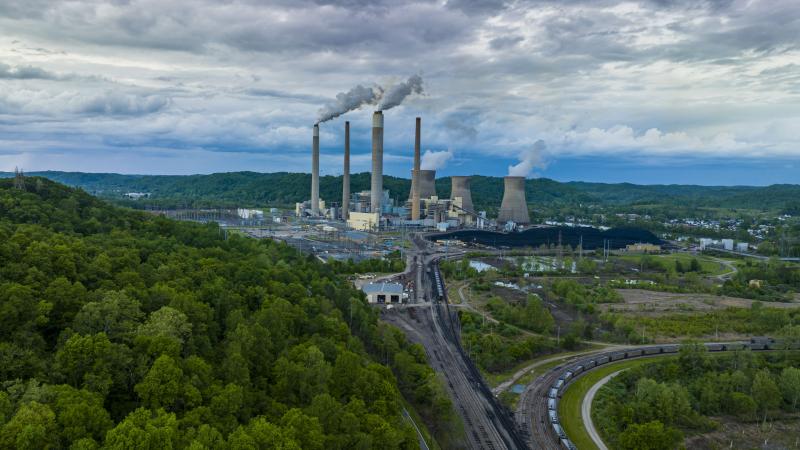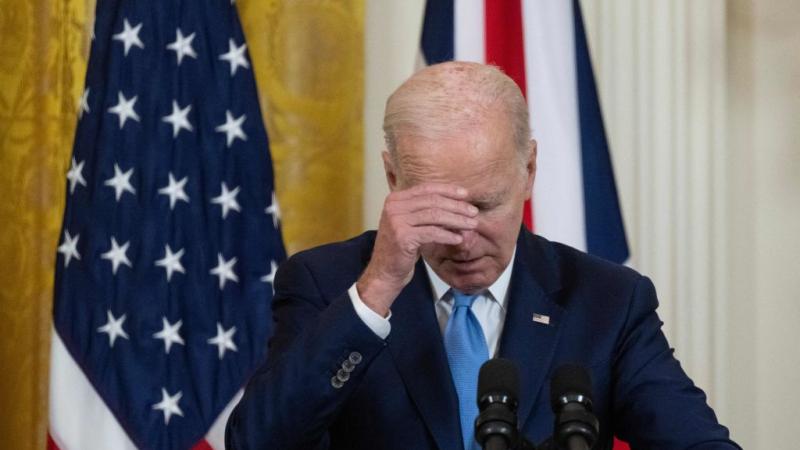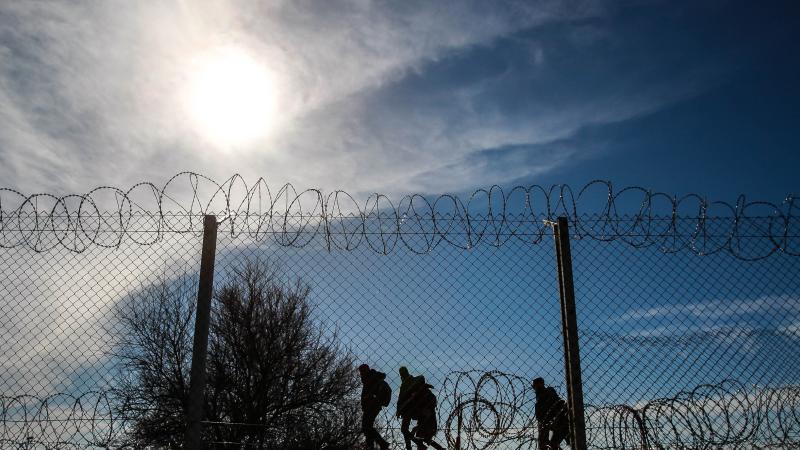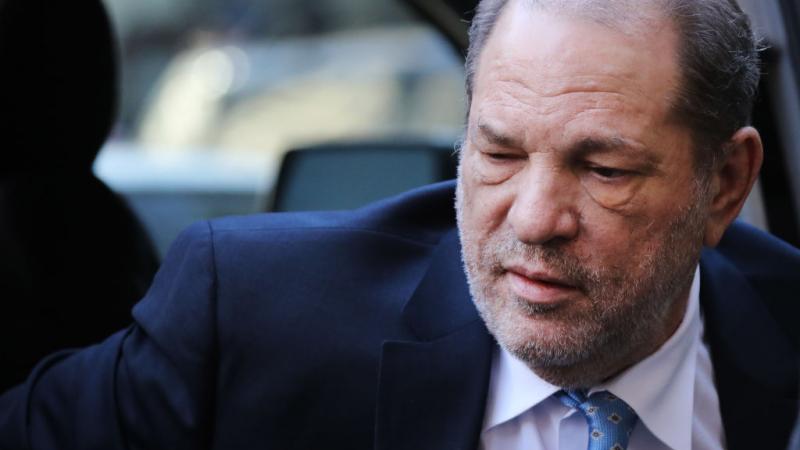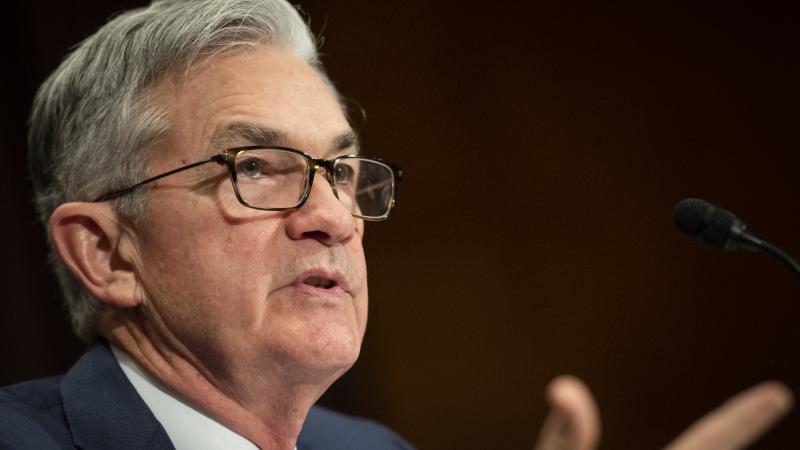White House whopper: Amid U.S.-Saudi clash, Biden, aides insist Mideast trip wasn't about oil
Administration officials continue to deny Biden's visit to Saudi Arabia this summer was about striking an energy deal, despite mounting evidence to the contrary.
When President Biden went to Saudi Arabia in July, it was widely reported that a key reason for his trip was to ask the Saudis, one of the world's largest oil exporters, to increase production to help lower global energy costs at a time when gas prices were hitting historical highs.
Three months later, however, with the Biden administration reeling from a recent decision by Saudi Arabia and other energy producers to cut oil production — the opposite of what Biden sought — U.S. officials, including President Biden himself, have continued to deny the July trip was about oil.
This apparent effort to spin a diplomatic humiliation at the hands of a longtime U.S. partner in order to mitigate the political damage has seemingly received buy-in from top levels of the Biden administration, which hopes to avoid a damaging blow to its credibility less than two weeks out from the midterm elections.
Earlier this month, the Organization of the Petroleum Exporting Countries (OPEC) and its non-member allies, a coalition known as OPEC+ led by Russia and Saudi Arabia, announced they were going to slash oil production by 2 million barrels a day, a move that could push up already high energy prices.
The White House, which had been desperately lobbying OPEC+ members to vote against the proposed production cut, decried the decision.
"The president is disappointed by the shortsighted decision by OPEC Plus to cut production quotas while the global economy is dealing with the continued negative impact of [Russian President Vladimir] Putin's invasion of Ukraine," White House officials said in a statement.
Other White House officials called OPEC's decision a "disaster," and Biden threatened "consequences" for Saudi Arabia without elaborating.
The day after OPEC's announcement, Biden said that while the move was disappointing, it didn't undermine the purpose of his visit to Saudi Arabia.
"The trip was not essentially for oil," he told reporters. "The trip was about the Middle East and about Israel and rationalization of positions. But it is a disappointment."
In a new bombshell story, however, the New York Times reported that top Biden aides had struck a deal with the Saudis to boost oil production through the end of the year, coinciding with next month's midterm elections.
"Lawmakers who had been told about the trip's benefits in classified briefings and other conversations that included details of the oil deal — which has not been previously disclosed and was supposed to lead to a surge in production between September and December — have been left fuming that [Saudi] Crown Prince Mohammed bin Salman duped the administration," the Times reported. "American officials said that, even days before the OPEC Plus decision, they had received assurances from the crown prince there would be no production cuts — and when they learned of the Saudi reversal, they made a futile last-ditch push to change minds in the royal court."
The Saudi Energy Ministry has denied doing a 180 on the reported oil deal. "The kingdom rejects these allegations and stresses that such mischaracterizations made by anonymous sources are entirely false," it said in a statement.
Despite the Times' report, White House Press Secretary Karine Jean-Pierre echoed her boss on Wednesday, denying the July trip was related to oil.
"The president's trip to the Middle East was not about oil," Jean-Pierre said during an appearance on CNN. Shen then touted Biden's efforts to try to lower gas prices before a CNN host asked if the administration had an understanding with Saudi Arabia that the Saudis backed away from.
"Again, the trip was not about oil," Jean-Pierre responded. "That is not what we went to do there."
On Tuesday, White House national security spokesman John Kirby wouldn't say if the U.S. had struck a deal with the Saudis to boost oil production.
"Look, there was — we talked about it before the trip, that — that energy security was going to be something the president talked about when we went; that we were having conversations with Saudi Arabia before the trip about better balancing supply and demand," Kirby told reporters.
"There were conversations before the trip," he acknowledged, "as you might imagine there would be, about — about an architecture that could better balance supply and demand to include what was — what ended up as an increase in production at the end of the trip."
Before the trip, experts, journalists, and other observers discussed how seeking a boost in oil production was a key goal of Biden's trip.
Indeed, oil played a major role in the backdrop to the July visit. Gas prices had reached an all-time high in June, peaking at a nationwide average exceeding $5 a gallon. They remained well above $4 at the time of the official presidential visit in mid-July and were dominating headlines, causing Biden to come under fire domestically.
Biden had been turning to other countries, including Saudi Arabia, as potential substitutes to fill the void in the global marketplace left by Russia, from which energy imports were banned by the U.S. in response to its invasion of Ukraine. Saudi leaders reportedly declined Biden's call over disagreements on other issues.
Biden then went to Saudi Arabi over the summer — a trip that experts told Just the News at the time was largely about oil, but wouldn't be successful due to Biden's policy toward the Saudis.
"It wouldn't be cynical to see that as the real purpose of the trip," said Gabriel Noronha, a former special adviser for Iran in the State Department. "But the Saudis would probably say no if Biden asked directly."
He explained the U.S. would need to use the trip to improve relations with Saudi Arabia more broadly and then follow up later about oil production.
"This is in large part a mission designed to get the Gulf Arabs to pump more oil to bring the international price of oil down," added former White House National Security Advisor John Bolton. "And I don't think they're going to be accommodating without making it clear just how unhappy they are with Biden's overall regional policy."
Perhaps the key area of disagreement between the administration and Saudi Arabia has been the former's commitment to strike a nuclear deal with Iran, the latter's regional rival. Under the deal that's been under discussion, Iran would agree to temporary curbs on its nuclear program in exchange for access to $274 billion in the deal's first year and at least $1 trillion by 2030.
Beyond Iran, another issue hurting U.S.-Saudi relations is Yemen, where Iranian-backed Houthi rebels have been fighting the Saudi-backed government and firing rockets and drones into Saudi territory.
Biden and Democrats in Congress have criticized Saudi Arabia for its conduct waging a war against the Houthis in Yemen, accusing the Saudis of human rights violations.
In large part due to opposition to the Yemen war and the killing of Saudi dissident Jamal Khashoggi, Biden promised during the 2020 presidential campaign to make Saudi Arabia into an international "pariah."
Last year, Biden removed the Houthis from the State Department's Foreign Terrorist Organization list, enraging the Saudis.
Meanwhile, following the OPEC decision, Biden is considering banning arms sales to Saudi Arabia, and Democrats in Congress introduced legislation to make such a ban law.
The Saudis, for their part, have reportedly considered accepting yuan, the Chinese currency, rather than dollars for some of its oil sales, in addition to the recent move by OPEC. The Wall Street Journal also reported this week that the Saudi crown prince has been mocking Biden in private.
Against this backdrop, many U.S. officials and some Democrats in Congress saw the OPEC decision as a Saudi attempt to meddle in a U.S. election — presumably to aid Republicans by making Biden look bad — according to the Times.
However, the Saudi Energy Ministry said in its statement that the "decisions of OPEC Plus are reached by the consensus of all members and determined solely by market fundamentals, not politics."
Regardless of the motivation, a diplomatic defeat for the Biden administration — one with potential economic consequences at the gas pump — is not what the White House wants days before a midterm election that, according to polls, is expected to result in a Republican-led House and possibly a Republican-led Senate.
But whatever happens, experts say the U.S. and Saudi need to mend their fractured relationship.
"The close, decades-long U.S. and Saudi relationship is not just energy-based; it's also rooted in national security," wrote Fred Fleitz, a former CIA analyst and senior National Security Council official. "Saudi Arabia is a crucial U.S. partner in promoting Mideast stability and also in countering Iran. Saudi Arabia also is the largest buyer of U.S. arms."

